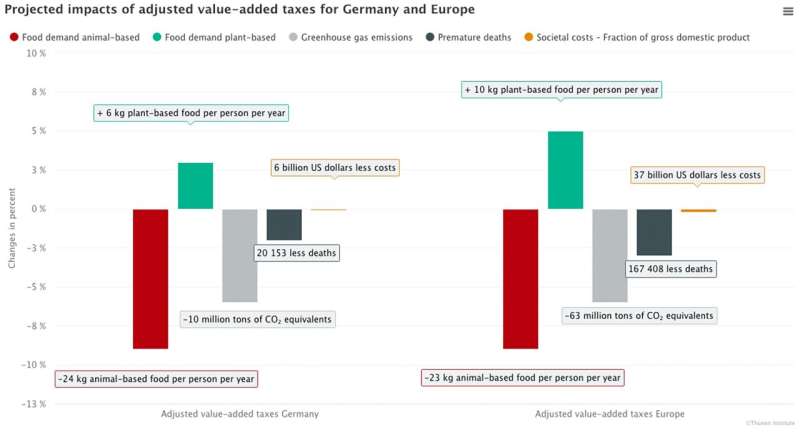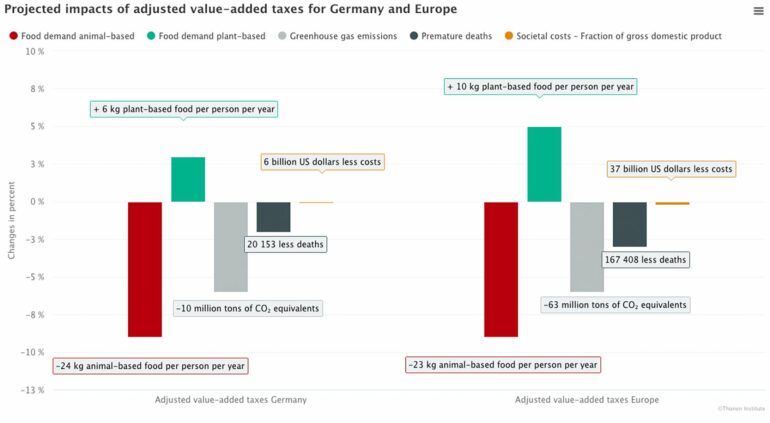by Katrin Schiedung, Johann Heinrich von Thünen-Institut, Bundesforschungsinstitut für Ländliche Räume, Wald und Fischerei
No value-added taxes (VAT) on fruit and vegetables, but increased VAT on meat and milk would have a positive effect on diet-related diseases, the environment, consumption and tax revenues, because food prices influence our buying behavior. This is the conclusion of research led by Dr. Marco Springmann, scientist at the University of Oxford, and Dr. Florian Freund, researcher at the Thünen-Institute for Market Analysis.
The study is published in Nature Food.
Reducing VAT on plant-based products and at the same time increasing VAT on animal-based products promises the most success. The projected consequences for Europe: The environmental impact would fall by 6%—for example, Germany would emit about 10 million tons less carbon dioxide. This is roughly equivalent to Latvia’s annual emissions. In addition, there would be 330 fewer diet-related deaths per 1 million people.
In Germany, there would be 20,000 fewer deaths. Tax revenues would increase by 46 billion US dollars, in Germany by about seven billion US dollars. The costs to society from diseases and climate damage would fall by 37 billion US dollars, in Germany by about 6 billion US dollars. “In order to minimize conflicting goals between the economy, the environment and human health, VAT should be adjusted to both product groups, if possible,” says Dr. Freund.
Adjusted VAT would be a step towards more sustainable food systems. Lower taxes on plant-based products would improve the nutrition and health of the population. The environment and tax revenues would benefit from higher-taxed animal-based products. “If a more targeted tax such as the CO2-tax cannot be implemented, a reform of VAT could be an easier way to make food systems more sustainable,” says Dr. Springmann.

Projected impacts of adjusted value-added taxes for Germany and Europe © Thünen-Institute
The European average VAT rate is 8% for meat and milk and 9% for fruit and vegetables. However, tax rates vary greatly from country to country. While hardly any taxes are levied on food in the United Kingdom, it is taxed with 25% in Denmark.
More than half of the countries surveyed have similarly high taxes on animal-based and plant-based products. More than a third of the countries even charge significantly higher taxes on plant-based products. Also, in Germany, the VAT on plant-based food is at just under 9% and thus higher compared to animal-based foods, which are taxed at 7%. A reform of VAT has already been discussed at the political level in Germany, but has not yet been approved.
More information:
Marco Springmann et al, A reform of value-added taxes on foods can have health, environmental and economic benefits in Europe, Nature Food (2025). DOI: 10.1038/s43016-024-01097-5. www.nature.com/articles/s43016-024-01097-5
Provided by
Johann Heinrich von Thünen-Institut, Bundesforschungsinstitut für Ländliche Räume, Wald und Fischerei
Citation:
Value-added taxes could promote healthier, more sustainable diets (2025, January 9)



